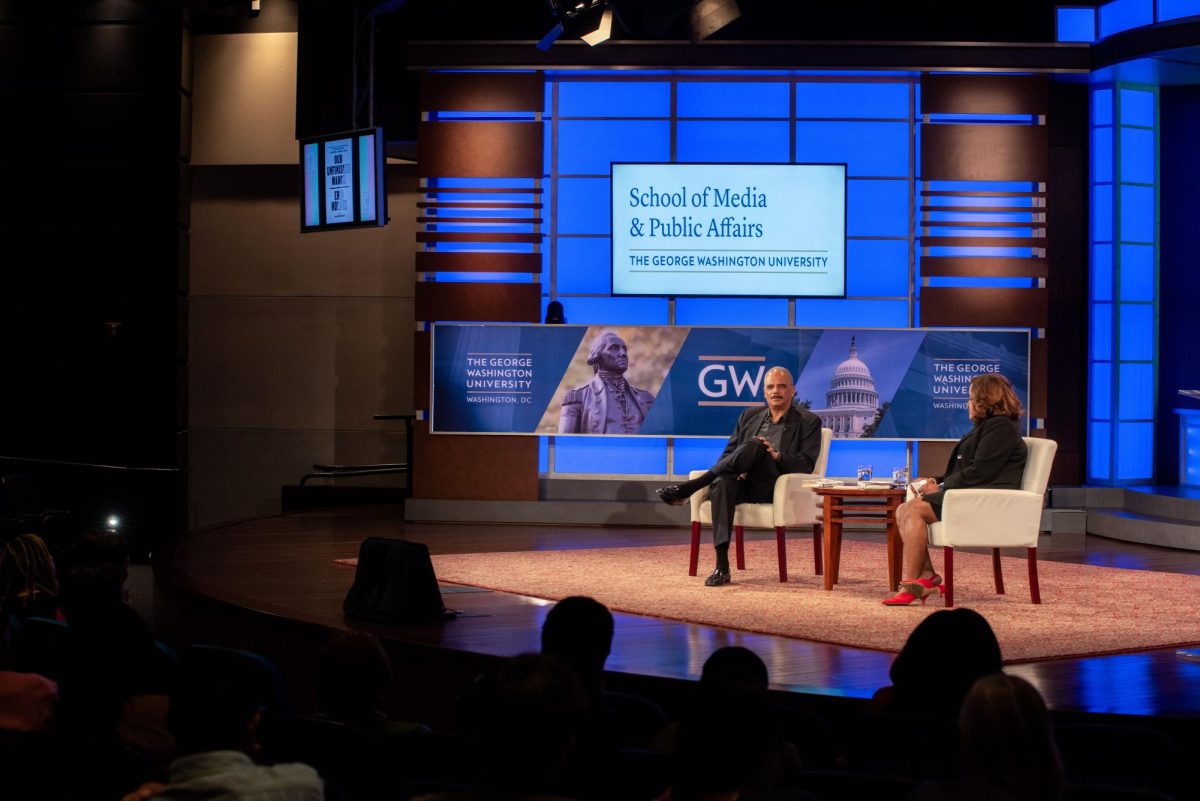A former U.S. attorney general discussed the future of voting rights and structural reform to protect democracy at the School of Media & Public Affairs earlier this month.
Eric Holder, the first Black attorney general, said democracy is currently at risk and that government leaders must strike down gerrymandering policies and voting barriers to ensure fair elections. The conversation about Holder’s new book, “Our Unfinished March,” with SMPA associate professor Cheryl Thompson was hosted by the Xi Zeta Omega Chapter of Alpha Kappa Alpha Sorority and SMPA on Oct. 11.
Holder said Republicans are suppressing voting by creating barriers to vote like regulating accommodations at polling locations and giving governors more power over elections. He referenced Harris County in Texas — the majority-Democrat county home to Houston – where Gov. Greg Abbott signed measures in June that eliminated the county’s nonpartisan election administrator position and gave the Texas secretary of state broad authority to intervene in the county’s elections.
Holder added that voter suppression is also a problem in Georgia, pointing to how the state’s Republicans passed election regulations in 2021 that banned handing out food and water to voters waiting in line to vote.
“It’s a sad thing that one of our political parties, as a part of its DNA, is making it more difficult for American citizens to vote,” Holder said. “That’s the thing that distinguishes this nation — the ability of the people to decide the policy direction of the nation.”
Holder said the Supreme Court is currently considering Alexander v. South Carolina, a case that will decide if officials drew voting districts in the state on the basis of partisanship or race, the latter of which is illegal. He said the case is an example of government officials “picking the winners” of elections before holding them because the state’s voting boundaries concentrate Black Democratic voters into one district, giving them a single representative.
Holder said he is hopeful the court rules in favor of South Carolina so the state can split that district into two, paving the way for the future election of another Black congressperson.
Holder said the Court should limit the terms of justices to 18 years because lifelong terms are “too long.” He said he would like to see a system where the president can appoint two justices, one in their first year and one in their third, which would eventually “depoliticize” the court.
“Having people serve in these unelected positions for 30, 40 years is giving too much power to people who are unelected,” Holder said.
Holder said he sees the Senate’s decision not to confirm Merrick Garland to the Court at the end of former President Barack Obama’s second term but to confirm Justice Amy Coney Barrett at the end of former President Donald Trump’s presidency as another way American democracy is ailing. He said Senate Republicans blocked Garland’s appointment in 2016 because of a “made-up rule” barring presidents from conducting confirmation hearings during election season, leading Trump to fill the seat with Justice Neil Gorsuch. Holder said Barrett’s and Gorsuch’s seats were “stolen” from Democrats.
Holder said the electoral college needs to be “abolished” because it doesn’t represent the view of the country’s majority. He said it is unlikely a constitutional amendment will strike it down but that an interstate compact — an agreement among states to award their votes to the popular winner — is more likely because of how hard it is to pass a constitutional amendment.
Holder said defending democracy is the best way to combat voter suppression and make change in government. He said showing up educated and ready to vote at a national, state and local level is the first step, especially in the upcoming 2024 elections.
“If we are not strongly defensive of our democracy, we could in essence lose it,” Holder said.
Holder said young people should not “sit on the sidelines,” which begins with voting. He recited a quote from Martin Luther King Jr., saying that “the arc of the moral universe is long, but it bends towards justice.”
“But here’s the deal — it doesn’t bend on its own, ” Holder said. “It only bends when people like us put our hands on that arc and pull it towards justice. So what we have to do is ask ourselves, ‘What are you doing to pull that arc towards justice?’”





